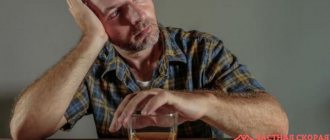The evening or night went off with a bang in excellent company. And in the morning something happened that always happens after drinking alcohol - a hangover. It always comes with headaches, terrible thirst, and nausea.
But this condition is also often accompanied by other symptoms - anxiety, melancholy, inner turmoil, or even tearfulness. This is one of the unpleasant consequences of drinking alcohol – post-alcohol depression. It can also be called an emotional hangover.
The man grabbed his head
Anxiety, oppressive sadness - not everyone understands how to get rid of it. Most people basically do not understand what is happening to them. They believe that this is an ordinary symptom of a hangover and do not try to cope with it. Sometimes it goes away on its own, but sometimes it entails a whole range of problems.
Content:
- Reasons for development
- Manifestations
- Treatment
Alcoholic depression
first described in 1920.
Subsequently, scientists confirmed the special nature of this condition, as well as the presence of various connections between alcohol addiction and the appearance of depressive symptoms. The likelihood of developing the disease depends on the severity of alcoholism - the longer and more a person drinks, the more often depressive episodes will occur, and the stronger they will manifest themselves. The prevalence of the pathology increases with aging. Most people suffering from alcoholic depression belong to the middle and older age groups (over 40 years old). In women, the disease is diagnosed more often than in men, but in the stronger sex, the clinical signs are more pronounced, and there is a higher likelihood of suicide. Many men's refusal to seek medical help contributes to the worsening of symptoms.
Medicines
There are no medications that can completely get rid of attacks. You should not take painkillers, antivirals or other medications and think that they will relieve a person from attacks. Seizures are not a disease and cannot be cured by taking a pill.
There are medications that can suppress anxiety, reducing the symptoms of panic. You can use folk remedies - soothing decoctions of medicinal herbs.
You can take medications only under the supervision of a doctor - a neurologist or psychotherapist.
The list of medications that a doctor can prescribe includes:
- sedative (based on plant components - valerian, motherwort),
- a tranquilizer, anxiolytic or a synthetic broad-spectrum agent (phenazepam, afobazole, seduxen).
But addiction to medications quickly develops. The doctor may prescribe an adrenergic blocker. But all these remedies are not a panacea. They don't always help. Rather, they are designed to save others from possible manifestations of unmotivated aggressiveness on the part of people susceptible to attacks. Medicines help keep the patient either in a state of semi-asleep or in a very relaxed state. At the same time, the person is conscious. The fear of not being able to gather oneself and physically respond to an ever-increasing threat can only intensify the manifestation of panic.
Medicines can only be taken in a state of absolute sobriety. Otherwise, the combination of alcohol and sedatives may cause unpredictable reactions. To the point where the person falls into a coma.
Reasons for development
Depression occurs under the influence of many factors, including disorders of general metabolic processes and metabolism in the brain, and personality changes. Physical illnesses and mental disorders typical of alcoholism, family, financial and social problems play a significant role. A depressive episode can develop against the background of withdrawal, binge drinking or acute alcohol intoxication.
The first place among the immediate causes of the manifestation of alcoholic depression is withdrawal syndrome. Mental suffering and somatic discomfort caused by stopping the use of alcohol lead to a feeling of meaninglessness and hopelessness, painting the world with black tones.
A common occurrence is one or more episodes during the period of treatment for alcoholism in a specialized hospital. At the initial stage, many people experience “sobriety phobia” - a strong fear of completely giving up alcohol. Alcohol was an important part of life, often a defining one. No matter how destructive it is, its disappearance leaves a feeling of loss, so a person goes through all the stages of grief, as with any loss.
The next depressive episode often develops before discharge from the drug treatment department and return to normal life. In the special conditions of the hospital, the patient has already adapted to do without alcohol, but outside its walls he will have to face the same difficulties and old experiences and somehow cope with everything without returning to the glass.
For some people, depression develops in remission. The disorder is triggered by a feeling of being lost, an inability to adapt, and the need to solve numerous problems without sufficient internal support and external support.
Such episodes often cause breakdowns and resumption of drinking.
It is worth noting the importance of individual psychological characteristics. People with low levels of serotonin (and, as a result, a reduced emotional background), severe mood swings, and mental disorders of the neurotic and borderline level are prone to the development of alcoholism. Addiction leads to personality changes and aggravation of the initially unfavorable psycho-emotional background, which further increases the likelihood of developing depression.
The consequences of alcohol or why depressed people drink
In terms of accessibility, wine substances are ahead of others: drugs and antidepressants. To get a dose, you do not need to look for a drug dealer or see a doctor. Alcohol abuse depresses the psyche and worsens health. Almost everyone knows this, but the lines at the wine counters never end. However, a mentally disturbed person tries to suppress depression in this way.
It is still common practice in society to ignore doctors’ recommendations. This happens for the following reasons: the influence of pop culture, a disharmonious environment, the lack of clearly formed life goals, undeveloped will, etc. In a depressed state, a person tends to strive for imaginary joys and not notice the voice of reason. To cope with anxiety, apathy and other negative symptoms, we like to resort to self-medication. To do this, it’s easier to choose affordable remedies that can instantly improve your well-being and relieve depression, such as hops.
Feeling better due to the action of ethanol. It stimulates the release of neurotransmitters that inhibit inhibitory transmitters. The part of the brain responsible for long-term planning and intense thinking is switched off. This allows you to push aside negative experiences for a while. For closed people, this mechanism helps to remove pressures and remove social anxiety.
But there is also a negative side. Over the years of taking it, a reflex is developed - a person stops planning actions, loses control and responsibility skills.
Why alcohol helps you feel better during depression
Scientists at Wake Forest University examined the condition of drinkers and found out interesting facts. Laboratory staff confirmed that ethanol acts on the same neurotransmitters as antidepressants, changes the expression of receptor signaling, and affects protein synthesis. The therapeutic effect lasts for two weeks. With systematic use, the healing regimen ceases to work: it leads to the destruction of the psyche and deterioration of physical health. A one-time dose eliminates anxiety within a day. Individual individuals perceive the same dose differently. The degree is determined by body type and type of metabolism.
It is still not known for certain why the same dosage causes a burst of euphoria in one person, while only slightly lifting the mood of another. In people experiencing euphoria, the habit develops instantly. It is also known that depressed individuals are prone to developing addiction, since they have an accessible substance in their hands that helps relieve unpleasant symptoms.
This theory explains a lot, but not everything. It is possible that relaxation is more important for people with anxiety disorders, while apathetic individuals need a surge of euphoria. Also, some people need both of these effects in different proportions, and a dose of the drink brings relief. It is important that in practice treatment with ethanol is impossible.
Manifestations
Clinical symptoms are often moderate, and a severe course is not typical. Signs of the depressive triad are identified , including emotional, intellectual and motor depression.
The disease is manifested by a persistent decrease in mood, loss of meaning, and a feeling of internal and external emptiness. The world is losing its former colors. What previously evoked pleasant emotions now seems unimportant, unimportant. Loss of the ability to experience pleasure (anhedonia) causes sadness. Elderly patients are prone to developing anxiety disorders.
Intellectual inhibition is manifested by difficulties in learning new things and mental activity. It is difficult for the patient to understand someone else’s thought, he quickly loses the thread of someone else’s reasoning, and cannot concentrate when answering a question. He has difficulty thinking and formulating. Perception becomes superficial, memory and attention deteriorate, spontaneity of thinking is lost. Productive thoughts are replaced by endless thoughts of gloomy content .
The person’s face takes on the appearance of a “sorrowful mask . Movements slow down. The voice loses its richness of intonation and becomes monotonous. The slightest effort seems exorbitant. The patient spends a significant part of the time immobile, may refuse to eat, and remain in bed all day.
Delusional and hallucinatory disorders are usually absent. Quite typical is the appearance of overvalued ideas about one’s own inadequacy, inadequacy, guilt, uselessness and uselessness. The past is seen as wrong, the future as hopeless. Past minor offenses in the eyes of the patient “grow” into unforgivable sins. Suicidal thoughts and actions are possible.
The consequence of depression can be the rapid development of the next stage of alcoholism . Aggressive behavior, deterioration of relationships with loved ones, and severance of friendships and family ties are possible. The course of chronic somatic diseases becomes more severe. The likelihood of household and work injuries increases.
When making a diagnosis, “drunken grief” - unlike real depression, this condition does not entail a feeling of hopelessness and anhedonia, and lasts no more than a few days. Sometimes withdrawal symptoms are accompanied by individual depressive symptoms, but the leading role in the clinical picture in this case is played by the withdrawal syndrome; psychoemotional disorders disappear after 1-3 days.
Alcohol and panic attacks
Ethyl alcohol has antidepressant properties. However, during the breakdown process, ethanol quickly turns into a dangerous substance that causes mental disorders. Therefore, panic attacks and alcohol have a direct connection.
Alcohol works according to this principle:
- The body produces the hormone of joy (dopamine). Alcohol blocks the work of its antagonists. The concentration of neurotransmitters increases. At the beginning of the feast, people experience euphoria, their rises , and their mood improves.
- Then an internal conflict begins in the body. At the subconscious level, a defense mechanism is triggered. Duality of desires arises. On the one hand, a person strives to stop drinking alcohol, on the other, he strives to prolong pleasant moments.
- The subconscious sends very contradictory and alarming signals to the body. One of the ways such signals manifest themselves is through panic attacks.
Treatment
Patients with alcoholic depression are hospitalized in the drug treatment department. The drug treatment regimen includes drugs from the following groups:
- Antidepressants. Citaprolam, sertraline, fluoxetine and amitriptyline are the mainstays of treatment. The minimum duration of treatment is several months. The medicine is selected individually.
- Tranquilizers. Zolpidem, lorazepam and analogues are prescribed in a short course at the initial stage of treatment. This helps to quickly alleviate symptoms of depression and reduce the severity of side effects that often appear in the first days or weeks of taking antidepressants.
- Antipsychotics. Necessary for severe cases with the development of delirium and hallucinations, phenomena of alcoholic delirium.
The antidepressant is prescribed in a small dose, then the dosage is gradually increased until a therapeutic effect is achieved. If there is no significant improvement within 3–4 weeks, the medication is replaced. In severe cases, a combination of several drugs is used. Taking medications must be supplemented with psychotherapy - this improves treatment results.
At the same time, alcoholism . Detoxification is performed using infusion therapy, drinking plenty of fluids and forced diuresis. To improve the condition of the nervous system, nootropics and B vitamins are used. Symptomatic drugs are prescribed to alleviate the symptoms of withdrawal syndrome. Provide therapy for identified chronic diseases.
How long does depression last after drinking?
It depends on the type of disorder.
- Depression associated with worsening addiction (in other words, from alcoholism). Diagnosed quite late. That is why the disease is already in an advanced stage. Treatment is complicated by the fact that the alcoholic is fully affected by psycho-emotional and personality disorders, and is no longer the same person he was before. Often some functions of the central nervous system are irreversibly damaged.
- Depression associated with withdrawal syndrome is easily diagnosed, treatable, and does not become a chronic pathology. Despite this, patients with this type of depression need the help of specialists, since the disease occurs in an acute form with suicidal behavior.
Depression is provoked by many factors - an organism exhausted by alcohol, a genetic predisposition, and a hereditary background. Depression can arise from existing subdepressive symptoms.
Doctors distinguish between clinically significant depression and worsening mood due to hangover. In the second case, there is no need to talk about depression, it is dysphoria, of which not a trace will remain after a week.
Clinical dysphoria and its symptoms can last up to 4 weeks. A specialist will help speed up recovery so that the exit from this condition is as quick and safe as possible.
Click here to view the conditions, tariffs and prices for treatment
Literature:
- Clinical and psychological characteristics of alcohol dependence combined with endogenous depression: a manual for doctors / T. G. Rybakova, O. F. Eryshev; Ministry of Health and Social Development of the Russian Federation, St. Petersburg Scientific Research. Psychoneurological Institute named after. V. M. Bekhtereva. – St. Petersburg: Publishing House of St. Petersburg Scientific Research. Psychoneurological Institute named after. V. M. Bekhtereva, 2008. – 26 p.
- Krylov, Evgeniy Nikolaevich./ Depressive disorders in the clinic of alcoholism: abstract of thesis. ... Doctor of Medical Sciences: 14.00.18 / Moscow. scientific research Institute of Psychiatry. – Moscow, 2004. – 35 p.
- Depression and alcoholism, clinical and social relationships: educational and methodological manual / Shcherbak E. A., Kutashov V. A., Sivolap Yu. P.; Ministry of Health of the Russian Federation, Voronezh State Medical University named after N. N. Bauman. – Moscow: RITM, 2021. – 173 p.
A few more tips
In case of panic attacks due to a hangover, you should lie down on a comfortable sofa, relax your body muscles, and try to breathe evenly. Also, treatment of panic attacks after alcohol should include drinking sedatives or herbal tea, cleansing the body of toxins. It is recommended to listen to pleasant , calm music or sounds of nature. You can sign up for a massage. Communication with loved ones, favorite hobbies, and walks in the fresh air will also help you distract from anxious thoughts.
As for the prevention of panic attacks, it is necessary to stop drinking alcohol (in whole or in part). Watch your diet and exercise. Spend more time outdoors, watch your sleep (it should be at least 8-10 hours). Visit an experienced neuropsychiatrist.
Panic attacks cannot be ignored.
Associated symptoms will only intensify over time. The support of loved ones is of great importance in the fight against attacks. It’s enough just to be nearby, talk , calm. Reproaches will only make the situation worse. You should remain as calm as possible. Instead of scandals, you need to convince your loved one to see a narcologist and change their lifestyle. Without this, all efforts will be in vain.
Why does a hangover make you feel bad?
The so-called hangover depression is a common condition after drinking. You may experience:
- anxiety,
- insomnia,
- bad mood for no reason
- dysphoria (feeling of unhappiness, displeasure),
- feeling guilty, even if you haven't done anything.
In the morning we feel all this because during yesterday's drinking, the work of some neurotransmitters (substances that carry out all the work in the brain): dopamine and serotonin was disrupted - or the sensitivity of the brain receptors to these substances was deteriorated. This mechanism is described in more detail in a separate article.
Is it possible to restore brain cells?
It was believed that a person is born with a specific number of brain cells, and if they are somehow damaged, then they cannot be restored. Scientists believed that neurons under the influence of ethyl alcohol were destroyed and no longer function. in order to restore their activity it is necessary to strengthen the remaining nerve cells, since there is no possibility of adding new ones. But in the second half of the last century, scientists discovered that the formation of new neurons is possible. This process is called neurogenesis. After this discovery, scientists developed a new approach to the treatment of disorders of brain cells.










